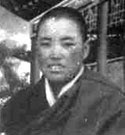
Phuntsog Nyidron
“All former political prisoners are suffering from all kinds of discrimination in Tibet: they are constantly under the watchful eyes of the Chinese security people; they have no jobs because of the fact they are former political prisoners, and therefore, they also suffer from poverty,” Ngawang Sangdrol tells VOA.
Sangdrol says she cannot forget her fellow prisoners in Tibet and she appeals to the U.S. government, Congressional leaders, and other international human rights groups to work on getting the release of one of the longest serving political prisoners Phuntsok Nyidron and other fellow prisoners in Tibet.
Sangdrol says these prisoners are suffering and “are in extremely poor” health and that no proper medical care is given to them. She says that when prisoners are badly beaten they are not given any medical care – even when they are bleeding. She also went through such experiences.
Phuntsok Nyidron, from Garu Nunnery, was arrested in 1989, tortured and sentenced to nine years in prison for her leadership in a peaceful pro-Tibetan demonstration held in Lhasa. In 1993, after recording pro-Tibetan songs in Drapchi prison, along with Sangdrol and others, Nyidron’s sentence was extended by eight years. Her 17-year sentence is one of the longest ever reported for female Tibetan political prisoners. She reportedly suffers from kidney problems and is in very poor health.
In an April 2, 2003, interview to NPR’s All Things Considered Sangdrol cited reasons for her concern for the Tibetan political prisoners. She said, “…having myself witnessed the physical torture of my fellow nuns, and also having heard about other sufferings that other people undergo, I am constantly encouraged to find whatever means to undertake further activeness, and I didn’t really think about these issues.”
Sangdrol says she will also make an appeal to U.S. government officials and the Congressional leaders to help restore the fundamental human rights of the Tibetan people. According to Sangdrol, currently, there are no human rights in Tibet. Any kind of political dissent is suppressed with merciless repression. She says that she and other nuns staged only peaceful demonstrations but met with brutal force by the Chinese security forces.
Sangdrol first became involved in political activities when she was 11 years old, participating in pro-independence demonstrations.
Since her arrival in the United States on March 28, 2003, Sangdrol has started to undergo medical examinations.
In response to a question about her future plans, Sangdrol told NPR, “Foremost, I want to have an audience with His Holiness, the Dalai Lama. And then, I want to contribute my bit towards fulfilling his aspirations for world peace in general and also for a resolution to the Tibetan problem so that the Tibetan people might enjoy their freedom.”

